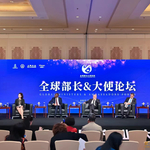LOS ANGELES–(BUSINESS WIRE)–Recently, the Global Ministers & Ambassadors Forum, one of the important events of the World Film Industry Conference, was held in Macau under the general title of SAIC Viloran. Mr. Alain Wong Yen Cheong, Ambassador of Mauritius to China; Mr. Bilal Ahmad Butt, Consul General of Pakistan; Mr. Gonzalo Javier Sabate, Consul General of Argentina in Hong Kong and Macau; Mr. Baher Sheweikhi, Consul General of Egypt in Hong Kong and Macau, Mr. Rafael Custódio Marques, Consul General of Mozambique in Macau; Mr. Ivan Seixas, Vice Consul of Brazil in Hong Kong; Ms.Krisztina Dóra Koletár, Trade Commissioner of Hungary in Hong Kong and Luc Bendza, Chief Representative of the African Film Institute in China. The eight guests expressed their views on the topic of “Cultural Exchange and Integration of the World Film Industry In the Context of Globalization”.
Film has become a cultural link to the world. This forum aims to provide a high-end dialogue platform for embassies, consulates and film institutions in China to discuss cooperation and create more favorable conditions for promoting global film culture exchange. Mr. Almas Seitakynov, Consul General of Kazakhstan in Hong Kong; Mr. Johnny K.S. Lam, Vice Consul of the Dominican Republic in Hong Kong; and Mr. Rodrigo Manuel Rocca de la Fuente, Consul of Argentina in Hong Kong, also attended the forum. In addition to the above guests, the organizing committee also received the letters of congratulations from Canadian Prime Minister Justin Trudeau, California Speaker Anthony Rendon, and representatives of many countries.
Mr. Baher Sheweikhi, Consul General of Egypt in Hong Kong and Macau: Egypt is the “Hollywood” location of the Middle East, and the Cairo International Film Festival, which has been held since 1952, is the oldest film festival in the Middle East. There are now 13 film festivals in Egypt, the most recent one being the Guna Film Festival, which is also very unique and new, held in the Red Sea coastal town of Hurghada. The world film industry was hit hard by the epidemic, but the Egyptian film industry recovered quickly after the epidemic, accounting for one-third of the box office in the Middle East.
Mr. Gonzalo Javier Sabate, Consul General of Argentina in Hong Kong and Macau: Argentina has a long history, especially in the film industry, and we have film cooperation with many Latin American countries such as Brazil and Mexico. We also have film festivals to introduce many Latin American films, including Independent Films Festival, and many well-made films are shown at the festival. For co-productions, there is a company that is a joint venture between Spain, Italy, Mexico, Argentina, Brazil and many other countries. We know that film is an expensive industry with very high costs, so co-production is very important for filmmaking and can also promote cultural exchange between countries. We have a lot of people involved in the film making process and have won some awards from Hollywood and Oscars. There are many countries filming in Argentina, which reflects the efforts of all parties in film co-production and the promotion of cultural exchange.
Mr. Bilal Ahmad Butt, Consul General of Pakistan in Hong Kong: Pakistan’s film industry is not particularly large, and after independence from India, Pakistan has started our own film production and film industry development. Although our film industry may be a little bit inferior to India’s, our dramas are translated into 15 languages and introduced to the world. In the context of globalization, we must also continue to promote cooperation and development of film. Through globalization, films from different countries can be seen in our own countries. Film is a very important way to introduce the traditional culture, beliefs and values of our respective countries to the world.
Ms. Krisztina Dóra Koletár, Trade Commissioner of the Hungary in Hong Kong: Hungarian film culture has a 100-year history. Since the establishment of the Academy Award, Hungarian filmmakers have won a number of awards. In addition to the Academy Award it also won the Golden Palme at the Cannes Film Festival and the Best Director at the Berlin Film Festival. Hungarian filmmakers have made great contributions to the global film industry. There are many Hungarian filmmakers who have gone to the United States, where they have produced fine films and promoted the development of the American and global film industry. Hungary is now the second most popular destination for filmmaking in Europe after the UK, because of our beautiful scenery and the great variety of locations to be found, especially in our capital city. In addition, we have a strong filmmaking policy, a favorable tax policy for the film industry, and appropriate film facilities and equipment. Our government has invested a lot of money to promote the film industry. We are also constantly promoting Hungarian films to the world. I think the films of different countries can help these countries to introduce their people, their culture and their society, so that people can learn from each other.
Mr. Ivan Seixas, Vice Consul of Brazil in Hong Kong: As a Brazilian, I am very proud of the fact that we have a very long history of filmmaking. We have films and dramas with social themes, as well as commercial films and other kinds of themes, but I think it is more important for films to be able to connect cultures across geographical borders and to communicate globally and to humanity. We need to have an active dialogue between East and West, as well as North and South, so that we can work together and let the global film industry hear the voices of various nationalities and races. Brazil is pleasure to work with countries around the world, especially China, to create a very large number of films with universal human values, to communicate human emotions, and to represent the voices of a larger population. Let’s better meet the challenges and opportunities and promote the development of the global film industry.
Mr. Rafael Custódio Marques, Consul General of Mozambique in Macau: Allow me to congratulate the organizers of this conference, the Aollywood Film workers Association and the World Film Industry Conference, for making this conference possible in Macau and for demonstrating the strong resilience of the Macau SAR of China as a multicultural society in the world. We all know that human beings exist in culture and create culture in various forms: music, literature, painting, film, and digital art. Art reflects social life, and the art of film is increasingly spatial and influential, reaching all social groups simultaneously at a faster pace, while achieving audiovisual enjoyment and allowing people to understand the social and cultural reality of being in a geographical space and time.
Mr. Alain Wong Yen Cheong, Ambassador of Mauritius to China: I accepted the invitation to this forum because I love film and I want to contribute to the film industry. There are many places in the world that are wonderful in their own way and film can tell us such wonderful things and can give us an insight into the culture of these countries. In Mauritius, everyone watches films from different countries at home on TV and it is wonderful how films can bring a very strong connection to different people around the world. When I was young, I had the privilege of experiencing the process of filmmaking, when a filmmaker came to Mauritius and I asked, “Why did you come to Mauritius to film?” Because Mauritius is quite remote and not very accessible, especially in the 1980s, but they thought Mauritius was a great destination for filming because the air is very pleasant, the light is very good and you can shoot films at different times of the day. Another advantage is that we have a lot of people who speak different languages, which makes the shooting go smoothly. We are also constantly expanding the scope of our cinematography services and support.
Mr. Luc Bendza, Chief Representative of the African Film Institute in China: Africa is a big continent, consisting of 55 countries, and each African country has a supportive policy for the development of films. Africa also needs films from all countries. Currently the most popular in Africa is kung fu films, the whole Africa loves kung fu films, I personally came to China to learn martial arts because of watching Bruce Lee’s films and Jackie Chan’s films. Films can give people an understanding of a country’s culture, traditions, and ethnicity. During the epidemic, there were many projects that were delayed, and I hope that through film people can understand each other and can live together in peace. Finally, I hope people will go to Africa to make films.
In the Q&A session that followed, the guests briefed on the initiatives taken by their respective countries in film education, and all agreed that the film industry needs more talents. The Global Ministers & Ambassadors Forum enhanced the exchange of film culture between countries and became one of the highlights of the 1st World Film Industry Conference.
Contacts
PR
[email protected]
917-789-4791








